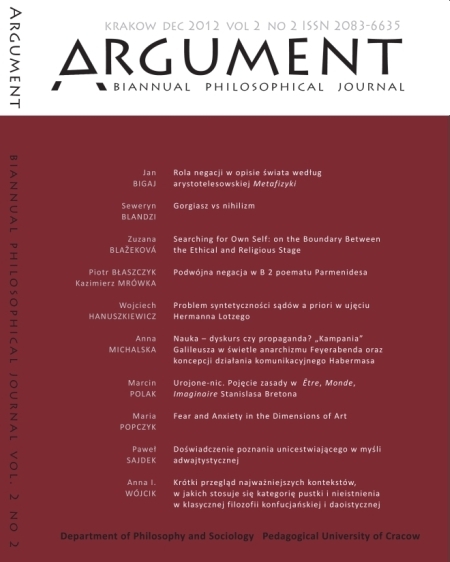Gorgiasza meontologia vs. nihilizm
Keywords:
Gorgias, Zeno’s elenctic method, existential nihilism, relative non-being, becoming, metaphysics of creationAbstract
Meontology of Gorgias vs. nihilism: The purpose of this paper is to challenge Gorgias’ image of a “nihilist existentialist”. The original thesis ouden estin, too frequently rendered as „nothing exists”, thus reducing the verb “to be” to denote “bare” existence, and ouden to denote “nothingness”. On close inspection, it turns out that, in Gorgias, neither do we have a negation of reality nor an affirmative treatment of the word “nothingness”.Therefore, ouden” should not be understood as a negation of all reality or a kind of affirmative “nothingness”, whereas “estin” should not be reduced to “bare” existence. (When existence is negated what we obtain is annihilation). Such practices still affect the various translations of Gorgias’ treaty On the non-being or on Nature. Gorgias’ “sophist” thought is typically interpreted as a joke or a parody of dialectical thinking of the Eleatics. In fact, as it turns out, he made no parody of dialectic but applied the elenctic, apagogic method in Zeno’s masterly manner. He did so not for an artificial purpose but to prove the absurdity of the hypothesis of absolute, transcendent (hence incognizable) one Truth-Being, which eliminates the non-being of becoming as absolute non-being. Gorgias argued in earnest in favour of relative being as such, Becoming as the only reality, which from the point of view of absolute being is after all non-being, but not-this-being, or relative non-being but not non-relative non-being, as the Eleatics had claimed. Gorgias’ positions appears to be an apologia of non-being which is, that is of Becoming. We do not transform the “nothing” into a “no thing”. The main question of the treaty is: what is predicated by the word “nothing”? Gorgias’ position can be recapitulated as “nothing is sc. true, there is no criterion because, after all, everything is opinion. It is reinforced further by meontological, i.e. anti-eleatic Gorgias’ emphasis: “No thing is Being (substance)”, because everything is Becoming. Thus the title if Gorgias’ treaty can thus be treated as as an antithesis to that of Melissos’, which - in our opinion - is to emphasize the “non-beingness” of nature, the non-substantiality of things. Therefore, if Gorgias’ text was polemical, and it questioned (while at the same time maintaining the positivity of Becoming as non-being) only the immutability of things, and thus we cannot speak of the existence or the cognizability of natures or of essences of things. In sum, the reasoning of Zeno and Melissos was of a kind that is apt to cut both ways, and that is what Gorgias showed. The argument given as peculiar to himself was to this effect. “What is not” is not, so, it is just as much as “what is”. It is as if the onset of the issues that Plato will take up in The Sophist as the problem of non-being understood as difference. The axis of Gorgias’s anti-eleatic critique, in our view, is his polemic with Parmenides’ famous thesis B3 regarding the relationship of identity or equality between noein and einai. It is an additional and perhaps the most important point of his critique that aims at demonstrating that such relationship is impossible. In brief, things are not words just as thoughts are not words.


